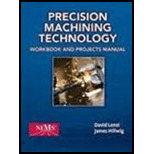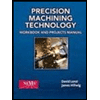
Precision Machining Technology (MindTap Course List)
2nd Edition
ISBN: 9781285444543
Author: Peter J. Hoffman, Eric S. Hopewell, Brian Janes
Publisher: Cengage Learning
expand_more
expand_more
format_list_bulleted
Textbook Question
Chapter 5.2, Problem 4RQ
List two advantages of using a self-centering chuck.
Expert Solution & Answer
Want to see the full answer?
Check out a sample textbook solution
Students have asked these similar questions
Calculate the vertical cross section moment of inertia for Orientations 1 and 2. State which number is the higher moment of inertia using equation 1. Given: b1=1 in, h1=1.5 in, b2=1.5 in, h2=1 in, t=0.0625 in. Then calculate the maximum deflection for a point load of 8 lb on the free end of the beam using equation 2. Given: E=10.1*10^6 psi.
1. ((bh^3)/12) - (((b-2t)(h-2t)^3))/12)
2. S = (PL^3)/(3EI)
1-69E The pressure in a natural gas pipeline is measured by the manometer shown in Fig. P1-69E with one of the arms open to the
atmosphere where the local atmospheric pressure is 14.2 psia. Determine the absolute pressure in the pipeline.
Natural
Gas
10 in
6 in
FIGURE P1-69E
Mercury
SG= 13.6
Air
2 in
+
25 in
Water
B
150 mm
120 mm
PROBLEM 15.193
The L-shaped arm BCD rotates about the z axis with a constant
angular velocity @₁ of 5 rad/s. Knowing that the 150-mm-
radius disk rotates about BC with a constant angular velocity
@2 of 4 rad/s, determine (a) the velocity of Point A, (b) the
acceleration of Point A.
Answers:
V₁ =-(0.600 m/s)i + (0.750 m/s)j - (0.600 m/s)k
a=-(6.15 m/s²)i- (3.00 m/s²)j
Chapter 5 Solutions
Precision Machining Technology (MindTap Course List)
Ch. 5.1 - List the four main parts of the engine lathe.Ch. 5.1 - What are the two main purposes of the lathe...Ch. 5.1 - What part of the lathe is used to set the feed...Ch. 5.1 - Prob. 4RQCh. 5.1 - Prob. 5RQCh. 5.1 - What is the purpose of the leads crew of a lathe?Ch. 5.1 - What two functions can the lathe tailstock...Ch. 5.1 - The standard taper in most lathe tailstocks is the...Ch. 5.1 - Define the swing and the bed length of a lathe.Ch. 5.2 - What is the special name for the type of jaw-type...
Ch. 5.2 - The most common variation of the above chuck has...Ch. 5.2 - Name two material shapes that can be properly held...Ch. 5.2 - List two advantages of using a self-centering...Ch. 5.2 - Name two material shapes that can be properly held...Ch. 5.2 - List three benefits of holding a workpiece between...Ch. 5.2 - List three potential advantages of using an...Ch. 5.2 - List three characteristics of a workpiece that...Ch. 5.2 - What type of mandrel would be ideal for gripping a...Ch. 5.2 - Name the type of tailstock center that raid be...Ch. 5.2 - What two auxiliary devices can be used to...Ch. 5.2 - Explain the differences between the two auxiliary...Ch. 5.2 - Name the device that is used to transmit the...Ch. 5.2 - Which two tool posts are the most efficient if...Ch. 5.2 - Which device may be used for either toolholding or...Ch. 5.3 - If a 0.050" depth of cut is taken on the diameter...Ch. 5.3 - A lathe cross slide uses a diameter-reading...Ch. 5.3 - In what units are feed rates measured for lathe...Ch. 5.3 - Are deeper cuts used for roughing or finishing...Ch. 5.3 - Calculate spindle RPM and machining time for...Ch. 5.3 - List three safety precautions related to clothing...Ch. 5.3 - What two materials are most commonly used for...Ch. 5.3 - What feature of a lathe cutting tool has a direct...Ch. 5.3 - Is a left-hand or right-hand tool normally used...Ch. 5.3 - What part of the lathe is used to feed the tool...Ch. 5.3 - When facing, why should the tool not be fed past...Ch. 5.3 - Should a left-hand or right-hand tool be used when...Ch. 5.3 - When and how should chips he removed from the work...Ch. 5.3 - What are two reasons for center drilling on the...Ch. 5.3 - When drilling and reaming on the lathe, how are...Ch. 5.3 - How can hole depth be controlled during drilling...Ch. 5.3 - What are two reasons boring may be selected to...Ch. 5.3 - Why must extra care be taken when performing...Ch. 5.3 - How can a tap be aligned when threading a hole on...Ch. 5.3 - Briefly define form cutting.Ch. 5.3 - How do grooving and cutoff speeds compare to...Ch. 5.3 - How can tool binding be overcome when cutting deep...Ch. 5.3 - List the two basic knurl patterns.Ch. 5.3 - How is knurling different from other lathe...Ch. 5.3 - List and briefly describe the two different types...Ch. 5.4 - The distance of actual contact of two mating...Ch. 5.4 - What feature of mating threads determines the...Ch. 5.4 - How many classes of fit are there in the Unified...Ch. 5.4 - Determine the major diameter limits for the...Ch. 5.4 - Determine the minor diameter limits for the...Ch. 5.4 - Determine the pitch diameter limits for the...Ch. 5.4 - Determine the approximate compound-rest in-feed...Ch. 5.4 - What is the name for the rotating device that...Ch. 5.4 - When threading, what is the reason for feeding the...Ch. 5.4 - Prob. 10RQCh. 5.4 - Why should the depth of cut be reduced for each...Ch. 5.4 - What dimension of the thread is measured by using...Ch. 5.4 - What measuring tool is used to visually inspect...Ch. 5.4 - List two applications of Acme threads.Ch. 5.4 - What type of thread is machined on a tapered...Ch. 5.5 - Briefly define a taper.Ch. 5.5 - What is the difference between an included angle...Ch. 5.5 - What does TPI stand for in relation to tapers?Ch. 5.5 - What are the TPI and TPF of a part with end...Ch. 5.5 - What are the corresponding centerline and included...Ch. 5.5 - What is the corresponding centerline angle of a...Ch. 5.5 - What is the limitation of the tool bit taper...Ch. 5.5 - What must be known to use the compound-rest taper...Ch. 5.5 - What taper turning methods allow use of the lathes...Ch. 5.5 - What two steps can be taken to eliminate backlash...Ch. 5.5 - The TPI specified on a print is 0.030". If...Ch. 5.5 - If TPF is 0.42", how much movement should register...Ch. 5.5 - What is the benefit of using the offset tailstock...Ch. 5.5 - What are two ways to reduce uneven pressure on...Ch. 5.5 - Calculate tailstock setover for a 13.5" part with...
Knowledge Booster
Learn more about
Need a deep-dive on the concept behind this application? Look no further. Learn more about this topic, mechanical-engineering and related others by exploring similar questions and additional content below.Similar questions
- 3 Answer: 002 PROBLEM 15.188 The rotor of an electric motor rotates at the constant rate @₁ = 1800 rpm. Determine the angular acceleration of the rotor as the motor is rotated about the y axis with a constant angular velocity 2 x of 6 rpm counterclockwise when viewed from the positive y axis. α = (118.4 rad/s²)iarrow_forward12 in.. 10 in. PROBLEM 15.187 At the instant considered the radar antenna shown rotates about the origin of coordinates with an angular velocity @ = ai + @j+wk Knowing that (VA) = 15 in./s, (VB), 9 in./s, and (VB), = 18 in./s, determine (a) the angular velocity of the antenna, (b) the velocity of point A. B 10 in. Answers: = (0.600 rad/s)i - (2.00 rad/s) j + (0.750 rad/s)k V₁ = (20.0 in./s)i + (15.00 in./s) j + (24.0 in./s)karrow_forward3. An engine has three cylinders spaced at 120° to each other. The crank torque diagram can be simplified to a triangle having the following values: Angle 0° Torque (Nm) 0 (a) What is the mean torque? 60° 4500 180° 180° to 360° 0 0 (b) What moment of inertia of flywheel is required to keep the speed to within 180 ± 3 rpm? (c) If one cylinder of the engine is made inoperative and it is assumed that the torque for this cylinder is zero for all crank angles, determine the fluctuation in speed at 180rpm for the same flywheel. (a) 3375 Nm (b) 50kgm (c) ±21 rpmarrow_forward
- Prob 5. Determine the largest load P that can be applied to the frame without causing either the average normal stress or the average shear stress at section a-a to exceed o-150 MPa and 1-60 MPa, respectively. Member CB has a square cross section of 25 mm on each side. 2 m FAC 1.5 m Facarrow_forwardDerive the component transformation equations for tensors shown below where [C] = [BA] is the DCM (direction cosine matrix) from frame A to B. ^B [T] = [C]^A [T] [C]^Tarrow_forwardCalculate for the vertical cross section moment of inertia for both Orientations 1 and 2 of a 1 x 1.5 in. horizontal hollow rectangular beam with wall thickness of t = 0.0625 in. Use the equation: I = ((bh^3)/12) - (((b-2t)(h-2t)^3)/12)arrow_forward
- Please answer 'yes' or 'no' and 'is' or 'is not' for the following:arrow_forwardConsider a large 23-cm-thick stainless steel plate (k = 15.1 W/m-K) in which heat is generated uniformly at a rate of 5 x 105 W/m³. Both sides of the plate are exposed to an environment at 30°C with a heat transfer coefficient of 60 W/m²K. The highest temperature will occur at surfaces of plate while the lowest temperature will occur at the midplane. Yes or No Yes Noarrow_forwardMy answers are incorrectarrow_forward
- Picturearrow_forwardWhat is the weight of a 5-kg substance in N, kN, kg·m/s², kgf, Ibm-ft/s², and lbf? The weight of a 5-kg substance in N is 49.05 N. The weight of a 5-kg substance in kN is KN. The weight of a 5-kg substance in kg·m/s² is 49.05 kg-m/s². The weight of a 5-kg substance in kgf is 5.0 kgf. The weight of a 5-kg substance in Ibm-ft/s² is 11.02 lbm-ft/s². The weight of a 5-kg substance in lbf is 11.023 lbf.arrow_forwardMych CD 36280 kg. 0.36 givens Tesla truck frailer 2017 Model Vven 96154kph ronge 804,5km Cr Powertrain Across PHVAC rwheel 0.006 0.88 9M² 2 2kW 0.55M ng Zg Prated Trated Pair 20 0.95 1080 kW 1760 Nm 1,2 determine the battery energy required to meet the range when fully loaded determine the approximate time for the fully-loaded truck-trailor to accelerate from 0 to 60 mph while Ignoring vehicle load forcesarrow_forward
arrow_back_ios
SEE MORE QUESTIONS
arrow_forward_ios
Recommended textbooks for you
 Precision Machining Technology (MindTap Course Li...Mechanical EngineeringISBN:9781285444543Author:Peter J. Hoffman, Eric S. Hopewell, Brian JanesPublisher:Cengage Learning
Precision Machining Technology (MindTap Course Li...Mechanical EngineeringISBN:9781285444543Author:Peter J. Hoffman, Eric S. Hopewell, Brian JanesPublisher:Cengage Learning

Precision Machining Technology (MindTap Course Li...
Mechanical Engineering
ISBN:9781285444543
Author:Peter J. Hoffman, Eric S. Hopewell, Brian Janes
Publisher:Cengage Learning
HOME SHOP JIGS & FIXTURES PART 1, TYPES OF JIGS & ACCESSORIES AND THE THEORIE BEHIND THE TOOLS; Author: THATLAZYMACHINIST;https://www.youtube.com/watch?v=EXYqi42JimI;License: Standard Youtube License